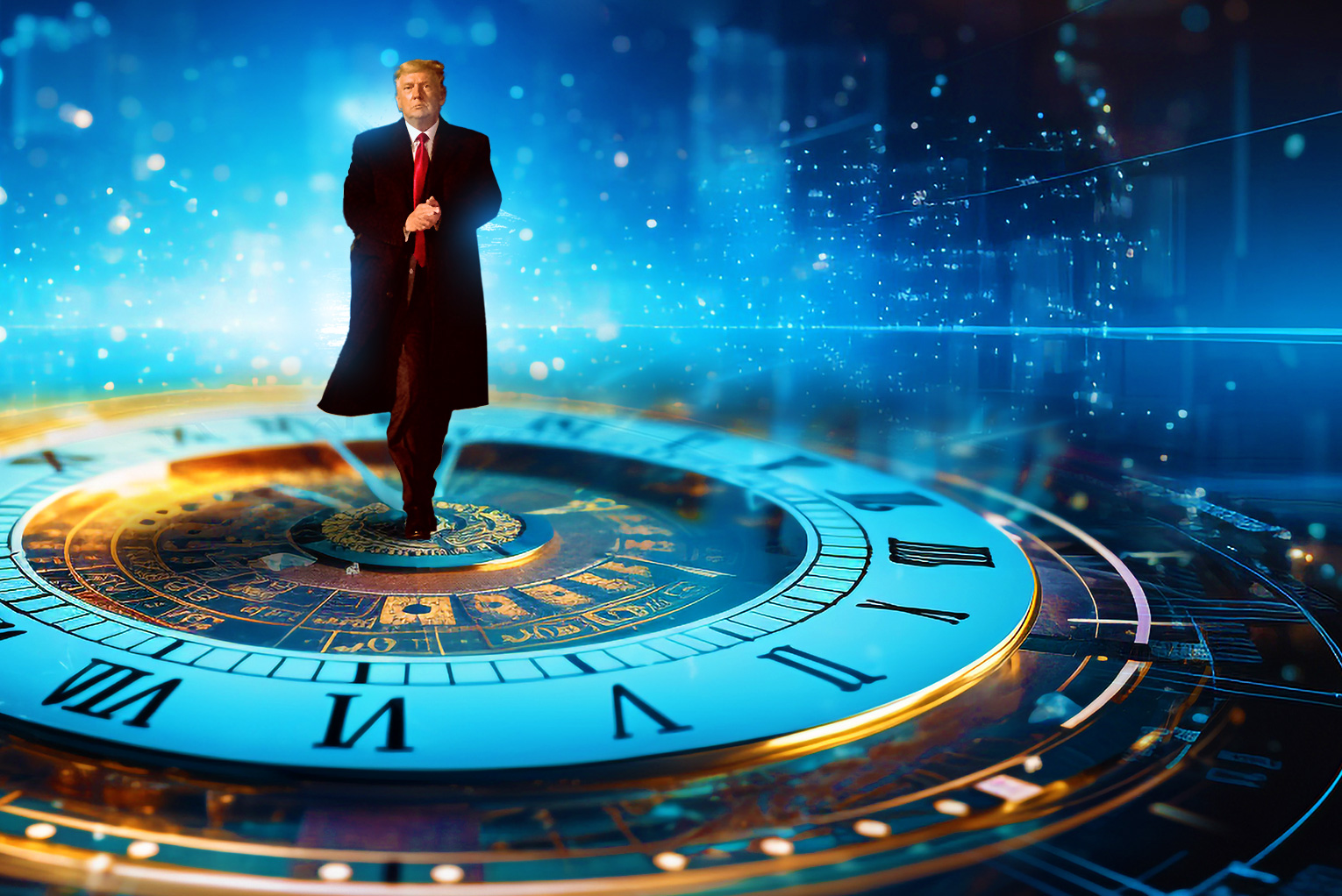[responsivevoice_button voice=”US English Male” buttontext=”Listen to this Feature” buttoncolor:”blue”]
The broad face is full of intelligence, and the large gray eyes are lighted up with a good-natured but quizzical look that invariably attracts attention,” (from Baron Trump’s Marvellous Underground Journey (1893), by Ingersoll Lockwood).
In what was described beforehand as the “shot heard around the world” by international prophetic voice Joseph Z, president Donald J. Trump survived an assassination attempt on July 13, 2024—sending shock waves around the globe. Later, he credited God for his miraculous hand of protection that saved his life.
As millions watched the campaign rally near Butler, Pennsylvania, Trump providentially turned his head at precisely the right moment, causing the bullet that likely would have killed him to miss and instead graze his right ear. Trump reached up to touch his bloodied ear and quickly took cover before the Secret Service’s sniper team returned fire, killing Thomas Matthew Crooks. “Bullets were continuing to fly as very brave Secret Service agents rushed to the stage…and pounced on top of me so that I would be protected,” Trump recalled a few days afterward at the Republican National Convention. “There was blood pouring everywhere, and yet in a certain way, I felt very safe because I had God on my side.”
After learning the failed assassin had been killed, Secret Service agents helped Trump to his feet. Upon seeing thousands of people “breathlessly waiting” to see if he had survived the fusillade of bullets, Trump shouted, “Fight, fight, fight.” mystery?
Origins of the Code
His rise to power began on June 16, 2015, when the world watched in wonder as he descended the Trump Tower escalator with his wife, Melania. The real estate titan, entertainment superstar and American patriot was entering a new realm: the swamp of the deep state in Washington, D.C.’s politics and corruption.
What ensued over the following years, a mixture of sneers, lies and hostility from elites, pundits and the mainstream media, was met with cheers, excitement and hope from everyday folks, businesspeople and conservative and Christian media. Not many knew that his shocking win in 2016, equally shocking loss in 2020, third run at the presidency and now a stunning assassination attempt would signal the shift into a hyperdeceptive time of fake news, wokeness, cancel culture, artificial intelligence, soaring inflation and looming nuclear war.
The chaos unleashed by Trump’s presence in politics and media is unprecedented—but not unforeseen. There were many in the prophetic community who had insights into what was going to happen and what the future held. Not least among these widely varied insights was the obscure but eerie Baron Trump novels written by the largely unknown lawyer and author Ingersoll Lockwood in the late 1800s. And that is along with the enigmatic Trump family legacy and Trump’s curious link to Nikola Tesla, the prolific inventor whose missing research papers on time travel and other “forbidden science” have raised questions about top-secret government programs along with a myriad modern technologies.
Prophecy from a Prime-time Cartoon?
Fiction has been said to be an artist (a writer or creator) going out into the world, seeing what is coming, and coming back to tell others what they have seen. Fox’s famed animated show The Simpsons, described by Entertainment Weekly as “TV seers,” and “eerily (or at least semi-) prophetic,” has a track record of doing just that. They predicted smartphones, Lady Gaga flying over the audience attached to cables like she did at the 2017 Super Bowl, and even Disney buying 21st Century Fox in the episode “When You Dish Upon a Star.”
In the case of Donald J. Trump, the show has often poked fun at him, but it accurately predicted his run and election in an episode of the show in 2000. The episode “Bart to the Future,” has Bart able to go 30 years forward and finds out that Trump had previously run the country. Another episode has a banner showing Trump running in 2024.
There are a dozen other examples of this in the show’s past, but the main question is, How are they doing it? Do they have a tap into the psychic world? Is God speaking to them?
While no one knows for sure, some of the show’s writers credit it to being immersed in the news, discussing things they think are outlandish, and coming up with plots that might take place.
It’s undeniable that something unique has happened when a cartoon for adults accurately predicts the election of a man many did not take seriously as a political figure—despite his repeated claims he would run for president one day. It seems that they were confirming words spoken by Kim Clement and others that Trump will have a second term and win in 2024. This phenomenon of fiction seeing into the future and telling us what might happen is not unique to The Simpsons or Trump.
Mission: Impossible 7 And Artificial Intelligence
The Simpsons aren’t alone as a fictional work predicting the real-world future:
Jules Verne predicted the lunar landing in his book From the Earth to the Moon in 1865.
In 1953, Ray Bradbury wrote about wireless technology in his book Fahrenheit 451.
1984 by George Orwell foresaw the surveillance state the world now lives in, with cameras on every street corner, watching all we do.
In 1909, E. M. Forster wrote in The Machine Stops about a time when people would live and work from their own rooms. The book also proposed people would be communicating with each other entirely through electronic means.
More recently, Sarah Pinsker’s novel Song for a New Day, published on Sept. 10, 2019, deals with a culture battling the combination of domestic terrorism and a deadly pandemic.
Also startling is the film Mission: Impossible—Dead Reckoning Part One. It has brought to mind the question: What does the most recent Mission: Impossible movie, starring Tom Cruise, have to tell us about artificial intelligence and its intrusion into reality? Is it predicting the future or preparing us to accept it? In the movie, we are thrown into a world that is stalked by a villain never seen before: an artificially intelligent creation that knows the future. But we don’t really know what it wants and why it wants it. The AI villain is known as the Entity, and it presents frightening problems and hits very close to home.
The Entity can hack any system, change reality at any time, and impact everyone’s decisions in a blink of an eye. The Entity has taken on a life of its own and is out of control.
While the intent of the Entity is not known in part one of the film, it is obvious that it wants to control the world and use it for its own gain. It has become a god, and it wants its wishes fulfilled.
While the ability to hack any database, gather data and store it in an ultimate manner is not new to us, the ability for the Entity to see the future is new for AI. Throughout the movie, as the good guys attempt to thwart its plans, the Entity predicts people’s motives, moves and deaths. In the minds of many, Mission: Impossible presents AI as the threat that it really is for mankind.
AI, Trump & the 2024 Presidential Election?
Another big question looms in the not-too-distant future: How will AI impact the U.S. elections in November 2024 and Donald Trump’s run at his second term?
Can AI predict the future like The Simpsons or even Ingersoll Lockwood, 131 years ago?
Currently there are organizations trying to use AI to forecast future events, basing their predictions on the GPT-4 language model. They have found that it can predict future events better than people.
Kira Radinsky, cofounder and chief technology officer at Diagnostic Robots, “a health care artificial intelligence system with predictive analytics,” believes AI’s ability to predict future events is only going to increase. She is a member of the United Nations Secretary-General’s high-level panel on digital cooperation, and she created an AI system that predicted cholera in Cuba, riots and other global events.
When asked if AI can predict the future, Radinsky replied, “I think the best way to predict the future is to create it. One of the things that we are doing right now is identifying the patterns, and when the patterns start, try to predict the next step. So, it can predict things that have a pattern. Random things? It’s a philosophical question. Do we even have random things? Or is it part of a pattern that we don’t have data for? So, if you believe there is no random thing and everything has a pattern, then AI can predict the future. We just need more data for that.”
Please pause for a moment and read her startling statement once again.
She said to predict the future, one needs to create it.
And they are doing it right now in our election cycle.
“Deepfakes already have affected other elections around the globe,” wrote Rehan Mirza, a research associate on the Democracy & Internet Governance Initiative. In response to robocalls impersonating President Joe Biden that went out to New Hampshire voters in January 2024, advising them not to vote in the state’s presidential primary election, the Federal Communications Commission issued a ruling making it illegal to use AI-generated voices in robocalls. The increase in robocalls has escalated during the last few years, and the AI technology has the potential to confuse people with misinformation by imitating the voices of celebrities and political candidates.
Politics is all about persuasion, and it has always been marked by propaganda. Exaggerations and outright lies are not uncommon in the political world.
“Because people are not angels, elections have never been free from falsehoods and mistaken beliefs,” said an article in The Economist. “But as the world contemplates a series of votes in 2024, something new is causing a lot of worry. In the past, disinformation has always been created by humans. Advances in generative artificial intelligence (AI)—with models that can spit out sophisticated essays and create realistic images from text prompts—make synthetic propaganda possible. The fear is that disinformation campaigns may be supercharged in 2024, just as countries with a collective population of some 4 [billion]—including America, Britain, India, Indonesia, Mexico and Taiwan—prepare to vote.”
As the country races toward the presidential election, the idea of lies being created by only people is out the window.
Now the lies can be supercharged and made to look so real that it is no longer possible to tell reality from pure fantasy.
Troy Anderson is a Pulitzer Prize–nominated journalist, bestselling author of Revelation 911 and other books, founder of the Inspire Literary Group, vice president of Battle Ready Ministries, co-founder of Revelation Watchers, and former executive editor of Charisma magazine and reporter at the Los Angeles Daily News and other newspapers. His latest book is The Trump Code, releasing Tuesday the 17th of this month, and is available on amazon.com now. He lives with his family in Irvine, California. Find out more at www.troyanderson.us and www.revelationwatchers.com.












































